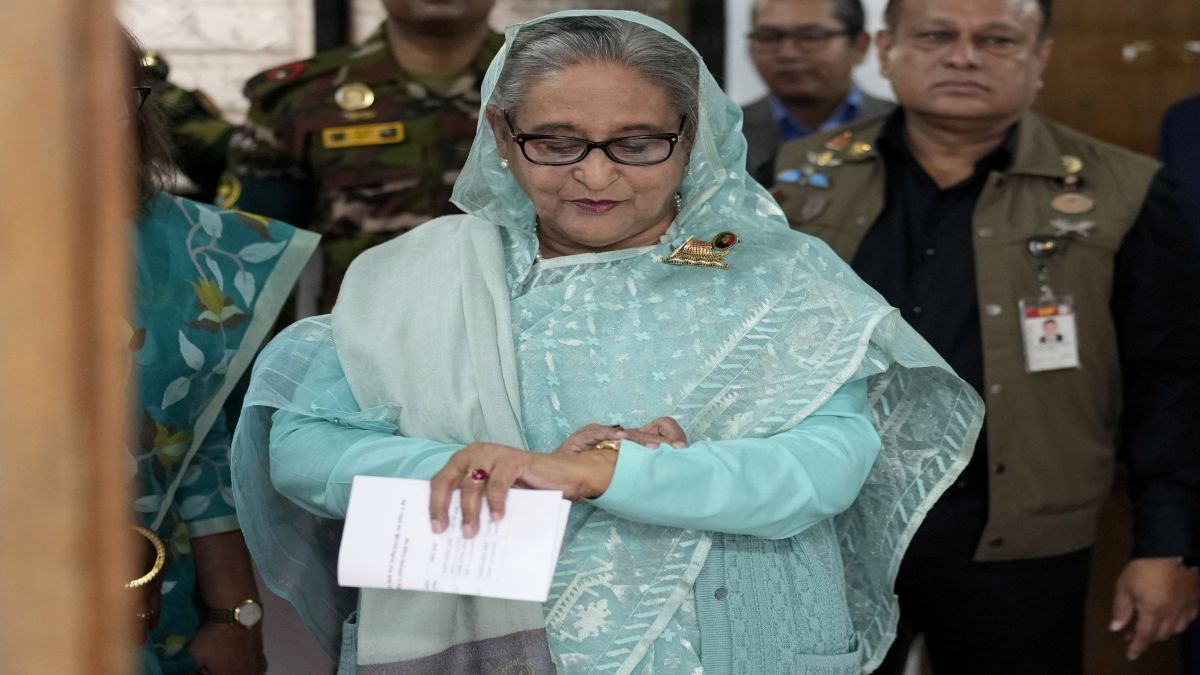On August 5, 2024, Sheikh Hasina, the former prime minister of Bangladesh, fled the country following a massive student-led protest that toppled her Awami League’s (AL) 16-year regime and sought refuge in India.
Now, almost eight months later, the Bangladesh Police has submitted a request to Interpol, seeking a red notice against her and 11 other individuals, which could mean more trouble for the deposed Bangladeshi leader.
What does this mean for Hasina? What does it mean for her extradition? We get you the answers.
Red corner notice against Hasina
On Sunday, news reports emerged that the National Central Bureau (NCB) of Bangladesh Police has submitted a request to Interpol seeking a red notice against former Prime Minister Sheikh Hasina, along with 11 other individuals.
Later, Enamul Haque Sagor, assistant inspector general (media), confirmed the same, telling The Daily Star, “These applications are filed in connection with allegations that emerge during investigations or through ongoing case proceedings.”
If approved, the red notice would enable provisional arrest and location tracking of the accused. “Interpol plays a key role in identifying the locations of fugitives residing abroad. Once the whereabouts of any absconding individual are confirmed, that information is relayed to Interpol,” said Sagor.
The notice comes after Bangladesh’s International Crimes Tribunal (ICT) issued arrest warrants for Hasina and several former Cabinet ministers, advisers, and military and civil officials for “crimes against humanity and genocide”.
Following this, last November, the Chief Prosecutor’s Office of the International Crimes Tribunal officially asked the police headquarters to get Interpol’s help in arresting Sheikh Hasina and others considered fugitives.
The Bangladesh government, headed by interim advisor, Muhammad Yunus, has been seeking Hasina’s extradition from India since she fled the country last August. And to this end, in January, the government said it would continue its efforts in bringing Hasina from India and would even seek international intervention if needed.
Red corner notice, explained
But what exactly is an Interpol’s red corner notice? The Interpol, which is an inter-governmental law enforcement organisation that assists and facilitates cooperation between national law forces in 196 member countries to combat transnational crimes, uses a ‘colour-coded’ system to alert and share requests for crime-related information among member countries and global organisations such as the United Nations, the International Criminal Tribunals and the International Criminal Court (related to sanctions, genocide, war crimes, and crimes against humanity).
As of today, the Interpol has eight types of notices. The most common is the red notice to seek the location/arrest of a person wanted by a judicial jurisdiction or an international tribunal with a view to his/her extradition.
Then there’s the green notice to warn about a person’s criminal activities if that person is considered to be a possible threat to public safety.
The Interpol also has a blue notice, which is to locate, identify or obtain information on a person of interest in a criminal investigation. The Interpol’s yellow notice is to locate a mission person whereas the black notice is to seek information on unidentified bodies. The Interpol also has a purple notice as well as an Interpol UNSC Special Notice.
Legal experts note that an Interpol’s red notice is an international alert for a wanted person, but it is not an arrest warrant. It contains information that helps identify wanted persons, such as their names, date of birth, nationality, and physical attributes such as the colour of their hair and eyes, as well as pictures and biometric data such as fingerprints if they are available. Red notices also mention the crime(s) they are wanted for.
Bangladesh seeks Sheikh Hasina’s extradition
Since her exit from Bangladesh last August, over 100 cases, including mass murder and graft, have been levelled against Hasina with the Bangladeshi administration seeking her presence in the country to stand trial for them.
However, Hasina, who is in hiding in India, refuses to return to New Delhi also showing no signs of extraditing her. Late last December, Dhaka sent all necessary documents to India to request the extradition of Sheikh Hasina . But the Ministry of External Affairs in New Delhi has maintained a reserved stance and, despite repeated inquiries, has refrained from making any further comments beyond an initial acknowledgment of receipt.
It’s important to note that India and Bangladesh have an extradition treaty in place, which was amended in 2016 to expedite the process. According to the treaty, the offence must be punishable in both countries. The accusations against Hasina are prosecutable in India, and the punishments for her alleged crimes are also substantial, so she can be extradited on these grounds.
But, New Delhi, according to Karan Thukral, an Indian Supreme Court lawyer specialising in extradition matters, can refuse the extradition request if there are credible concerns about charges being politically motivated and potential judicial proceedings in Bangladesh being unfair.
Even other geopolitical experts note that India is unlikely to extradite Hasina. As The Diplomat noted agreeing to Dhaka’s demand could strain India’s diplomatic relations with other nations wary of perceived political retribution, making Hasina’s extradition seem like a non-starter.
Bangladesh Supreme Court lawyer Rashna Imam also told South China Morning Post that India may not be keen to extradite Hasina because it is “competing with China to become a superpower” and becoming a “regional hegemon” would pave the way for that. “Hasina compromised the interests of Bangladesh in many ways in exchange for India’s backing to retain power. India is worried that if it does extradite Hasina, it might send out a message to its existing and future allies that India does not fulfil its end of the bargain when the time comes,” she was quoted as telling This Week in Asia.
However, an outright refusal to extradite Hasina will also have consequences for New Delhi. Hence, maintaining a wait-and-watch option is India’s best choice, for now.
With inputs from agencies


)

)
)
)
)
)
)
)
)



